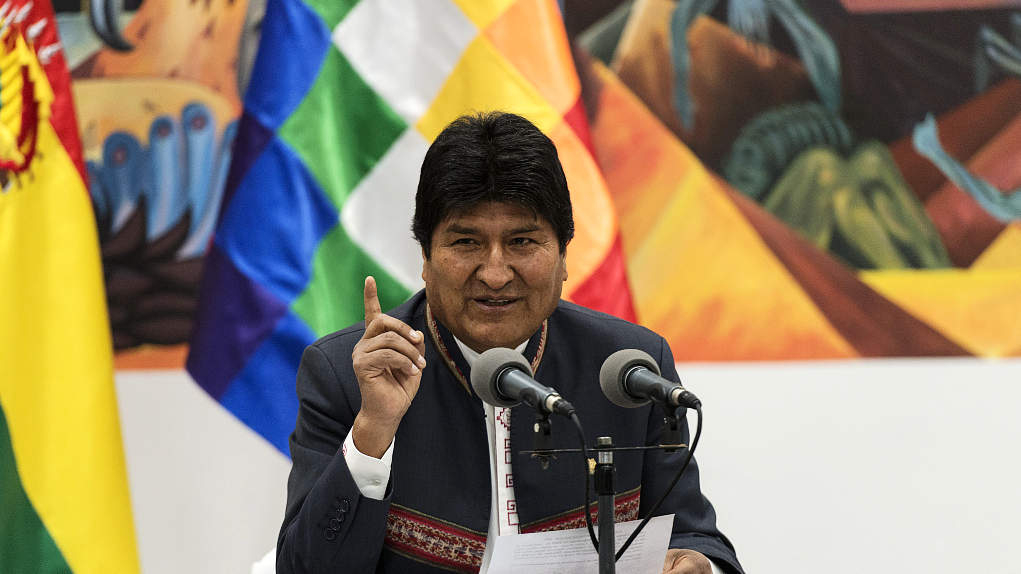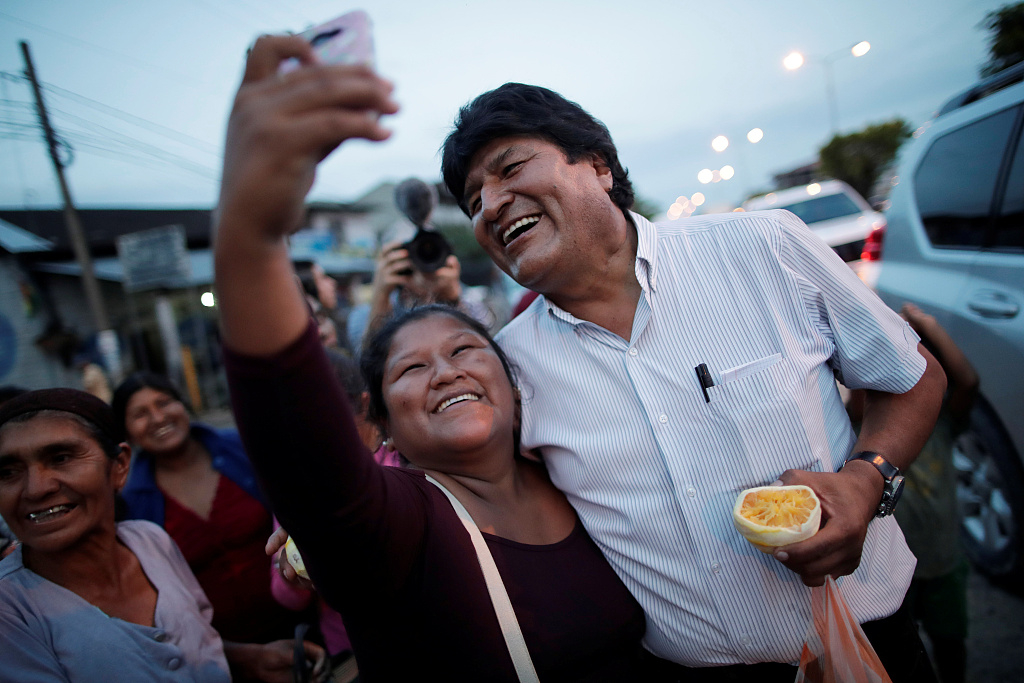
Evo Morales, Bolivia's president, speaks during a press conference at the Presidential Palace in La Paz, Bolivia, Oct. 24, 2019. /VCG Photo
Evo Morales, Bolivia's president, speaks during a press conference at the Presidential Palace in La Paz, Bolivia, Oct. 24, 2019. /VCG Photo
Editor's Note: Tom Fowdy is a British political and international relations analyst and a graduate of Durham and Oxford universities. He writes on topics pertaining to China, the DPRK, Britain and the United States. The article reflects the author's opinions and not necessarily the views of CGTN.
Last Sunday, President of Bolivia Evo Morales resigned after accusations that the country's election held on October 20th had been manipulated, causing unrest throughout the country. Although he agreed to a re-run, the indigenous socialist leader found himself under pressure from the military and other elites within the state. With his own political allies allegedly under attack, Morales said he was standing down in order to protect them. Supporters of Morales claim that democracy has been subverted, and that his removal is a coup.
Although the United States has made little public comment on the situation in La Paz, it nevertheless gave low key support for new elections which reflect "the will of the people of Bolivia"- supporting a finding by the D.C. based and funded the Organization of American States (OAS) which taken a line against the Morale government. However, there are some things worth keeping in mind: Evo Morales was a critic of the United States and its foreign policy in Latin America.
The Trump administration has, since taking office, pursued a "Neo-Monroe Doctrine" based on the longstanding premise that the U.S. must indisputably dominate the Western hemisphere, and has aggressively pursued the removal of regimes that is deemed critical of American hegemony.
This has included hostile policies towards Cuba and Venezuela. With Morales being an ally of those regimes, there is likelihood the opposition which replaces him will be stridently more pro-Washington.
The OAS as a legitimate monitor of elections in Bolivia shouldn't be taken seriously. There are good reasons why. Based and funded in Washington D.C. the organization is little more than a partial vehicle for U.S. foreign policy interests in the region which has, despite claiming to represent all countries in the Americas, has repeatedly isolated and ostracized countries hostile to the United States. Cuba for example, was suspended from membership from 1962 to 2009, admitted in this era due to Obama's willingness to reconcile with Havana.

Evo Morales takes a selfie with a resident on a street in Shinahota at the Chapare region, Bolivia, Oct 19, 2019. /VCG Photo
Evo Morales takes a selfie with a resident on a street in Shinahota at the Chapare region, Bolivia, Oct 19, 2019. /VCG Photo
However, the atmosphere in Washington has changed for the worse. Since his election, the Trump administration has taken a more hard line approach against countries in the Latin America under the mantra of what has been described as a "Neo-Monroe doctrine" that is the foreign policy objective that no government who is hostile to, critical of the United States, or too close to other powers should be tolerated. Historically, Washington has repeatedly courted right wing elites in these countries and supported them in quashing popular socialist movements that contravene the U.S. national interest.
On this background, and with the accusations against Morales stemming largely from the OAS- there is a substantial likelihood that the Washington have also sought to, albeit gently and indirectly, usher the Evo premiership out of office.
With his administration of course not being authoritarian, but a viable democracy, and secondly not economically disastrous with his policies having made great gains for standard of living in the country, this has made it harder to attack and advocate for change publicly- thus resulting in a "soft" approach by courting a series of state elites, in this case the military and wealthy oligarchs.
This outcome largely resembles that of Brazil in the past few years, whereby the hugely popular socialist President Lula was removed from office by elements of the state apparatus, imprisoned under stumped up charges and then with an ultra-pro-U.S. leader, Jair Bolosonaro ascending to power.
Given this, Morales' eventual replacement is likely to be of a similar caliber, which will quickly move to assert the pro-capitalist, pro-U.S. business elite with the view of undoing his socialist economic legacy, and likely moving to offer Washington support on issues such as Venezuela.
Thus, as a whole, the Evo Morales saga comes to its climax with one wondering if the Monroe Doctrine has struck yet again? Washington's support has been subtle and low key, but evident. Bolivia loses its first indigenous leader, a man who never had any record of misrule or heavy-handed governance.
(If you want to contribute and have specific expertise, please contact us at opinions@cgtn.com.)